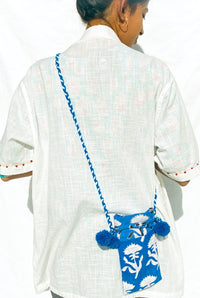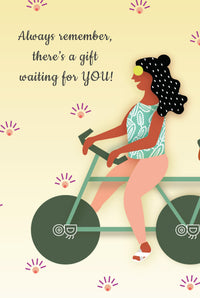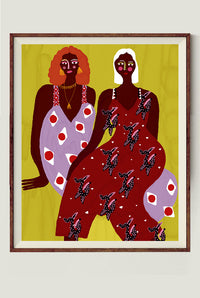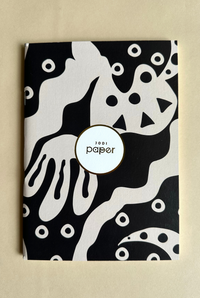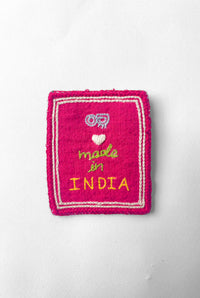Motherhood, Memory, and the Messy Middle

When Meera Ganapathi wrote her first story at the age of five—a murder mystery, no less—her mother was understandably a bit concerned. But if that early glimpse into her imaginative mind hinted at anything, it’s this: Meera has never been one to tell stories the way they’re “supposed” to be told.
A former advertising professional, Meera is the founder and editor of The Soup, a literary and arts publication with a distinct voice. She’s also the author of several children’s books including The Girl Who Could Not Stop Laughing, Uma vs Upma, A Friend for Poochi, and Paati vs Uncle. Her writing has appeared in anthologies like Cat People and A Case of Indian Marvels, and her latest work, How to Forget—a lyrical blend of poems, prose, and memory—published this year.
Since then, she’s built a career out of telling the kind of stories that slip through the cracks of convention. Meera reflects on how motherhood rewires creativity, why the “capable woman” trope deserves an unceremonious send-off, the strange poetry of postpartum edits, and why storytelling lives not just in books but in clothing, hair flowers, and late-night walks.
JODI: Do you remember the first story you ever wrote? What was it about?
MEERA: Yes I do actually. I was five or six years old and I wrote about a murder and it made my mother a bit worried for me. :-D
JODI: How did The Soup come to life? Was there a particular moment that sparked the idea?
MEERA: I had been working in advertising for nine years by then and was very interested in using the freedom of the internet to diversify in terms of ideating. I wanted to tell stories to readers who cared about the same things I did. But it was only when I could afford to quit my day job, I took up the challenge of starting The Soup.
JODI: You’ve worn many hats—advertising, editing, writing. If your life were divided into book chapters, what would this current chapter be called?
MEERA: Motherhood, Allergies and How I Learnt to Finally Appreciate the Afternoon Nap.
 Meera wears our Nama Dress
Meera wears our Nama Dress
JODI: You’ve written several children’s books—how do you tap into the world of a child while writing?
MEERA: I grew up in a large family of brothers and cousins, some of these cousins are much younger than me and I would play with them and tell them stories even as a teenager. I draw from the experience of watching them grow up and from my own experiences as a child to make up stories now. The thing however is that children are clever and sensitive, so it’s important not to make assumptions about their capacity to understand. So I also bring bigger subjects into the work like loneliness or insecurity or even ageism. Paati vs Uncle is about ageism, and is in many ways about my own grandmother and even my mother as a senior citizen, looking for relevance and meaning in their lives. Children who grow up around grandparents are especially attuned to their stories, their mannerisms and their needs, and they would empathise and understand perfectly.
JODI: Has motherhood changed the way creativity flows for you, or do you find it sneaking up on you in new ways?
MEERA: It’s very hard to work as a new mother and I have so much respect for women who have 9-5 jobs in offices. I work from home as a freelancer and I have a good support system, despite this, editing my book at three months postpartum was extremely difficult for me. You simply don’t have the mental faculties to operate smoothly when you’re on 4 hours of sleep, looking and feeling like a bad-tempered ghoul. But some things have to be done. I have realised however that there are no prizes for stretching yourself beyond your capacity, so I have made peace with the idea of taking things slower and working on fewer but very meaningful projects.

Meera wears our Nama Dress
JODI: What’s one thing about being a mother that completely took you by surprise? The good, the bad, or the wonderfully weird!
MEERA: Watching a baby grow will make you notice the world differently. I knew this theoretically, but I could have never imagined how it would feel. Watching a baby pause to simply look at trees swaying in the breeze, or the excitement of a new fruit that he’s never tasted before…it reassures you in some ways about the world. If you’re jaded, babies can un-jade you. About the bad, I think they need to tell more mothers about the anxieties, stressors, hormonal ups and downs that come with breastfeeding, we do not know enough until we’re in it. The wonderfully weird thing is becoming aware of the capacities of our bodies as women, as your body expands, accommodates, makes food, gives comfort- it’s so much more than size and appearance after motherhood. I’m saying all of this as a fairly new mother, there will be so many other more profound or even annoying learnings along the way, I’m sure.
JODI: Have you ever felt like the world had a rulebook for what kind of stories women should write? And did you promptly set it on fire?
MEERA: Compared to how things were, we are headed in a better direction. For instance, the book Nightbitch, is a good example of a story on motherhood that could have triggered people before. But I come across threads on reddit where women declare their gratitude for the existence of this book, it reaffirms a feeling that would’ve seemed debased before but is in fact a reality for many. Certain subjects like menopause, sex in your sixties, the pressure to want to look young but not give up on your ideals, the underbelly of motherhood…we haven’t scratched the surface of these conversations. By now there is an awareness that there is no one truth and no one kind of womanhood and while stereotypes still abound based on sales and trends (sad girl lit, for instance), the only true requirement of fiction and literature is the need for different voices.
JODI: Is there a story that’s been living inside you for a while but hasn’t made it onto the page yet?
MEERA: There are one line ideas in my notes app that have been collecting cobwebs and need to be revisited. Soon, soon.
JODI: Do you see fashion as a form of storytelling, much like writing?
MEERA: Absolutely. Some people really have the knack of using their clothing to comment on mood, history, identity and self-expression. And others may not do it as consciously, but if you look carefully, it’s always there- a dialogue in the clothing. You know, our cook likes to wear flowers in her hair and since this is Goa, there is an abundance of flowers. So each month, the flowers change and in her hair arrangements, there’s a story of seasons. If you read into the details, there are stories.
 Meera wears our Dani Applique Shirt
Meera wears our Dani Applique Shirt
JODI: If you could rewrite one stereotype about women—toss it out and start fresh—what would it be?
MEERA: I dislike the idea of the “capable woman.” It’s too much pressure and manipulative praise for putting yourself last, burdening yourself beyond your capacity, juggling everything all at once to be seen as worthy. Ultimately it’s also such mediocre praise, you’re not great, you’re just good enough to accommodate everything that’s asked of you without complaint or assistance.
JODI: You’ve contributed to anthologies that highlight contemporary Indian writing. What excites you most about the literary landscape in India right now?
MEERA: I feel there’s an ugly trend of choosing writers and promoting them based on Instagram numbers. Then there are people who pander to a very, very specific niche audience for literary praise; and both these brackets of writing feel tiresome in their own way. I long for books like Djinn patrol on the purple line or Nilanjana Roy’s Black River that are compelling to passionate readers and snobs alike. I don’t know if I answered this question, lol.
JODI: If someone had never read your work before, which piece would you want them to start with and why?
MEERA: This one: https://www.instagram.com/p/Cu_xoIjtsuH/?hl=en
I think it explains everything about my work.
JODI: Is there a new book brewing? Can we get a little sneak peek about what you’ve been working on?
MEERA: Yes. The book is called ‘How to Forget’ and it’s out in May, published by Harper. It’s told in poems, prose and photos collected in personal and communal memories, chronicling lifetimes through the act of walking. It is about an elephant herd wandering through nights to find an old home, but also about a woman who confronts the night alone. It's about prawns tossed in chili oil, a lost childhood, rabbits, witches and the transactional nature of adult friendships. And it’s put together in 55 walks across cities and small towns. I’m so nervous, so excited for it to be finally out in the world.


JODI: If you could plan your ideal Goa day, what’s on the itinerary?
MEERA: It will involve a scooter and breezy weather that comes in the early-early monsoon. But the thing is if you live in Goa long enough, you’re just very genuinely content at home.
JODI: You live with a misunderstood cat—if Apple could write a book about you, what would the title be?
MEERA: I like you best when you’re feeding me.
JODI: If you could invite three fictional characters to a dinner party, who would they be and why?
MEERA: Off the top of my head, a few iconic female characters- Elizabeth Bennet, Minerva McGonagall and Matilda. I think I could be friends with all three. But this table would need an edge so perhaps Baba Yaga because she’s my favourite character of all time. I’ll also sneak Moaning Myrtle into the toilet to give everyone something to talk about, the next day.
Muse: Meera Ganapathi

